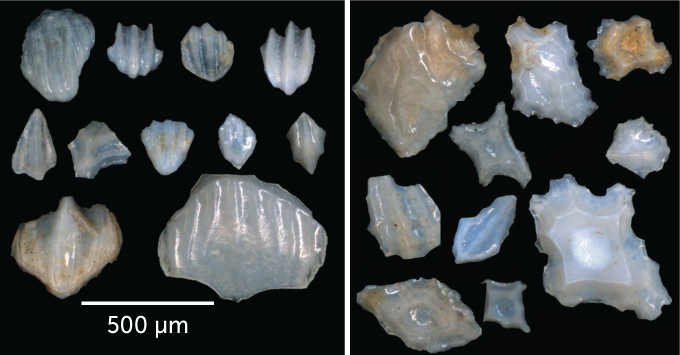This post was originally published on this site
About 19 million years ago, something terrible happened to sharks.
Fossils gleaned from sediments in the Pacific Ocean reveal a previously unknown and dramatic shark extinction event, during which populations of the predators abruptly dropped by up to 90 percent, researchers report in the June 4 Science. And scientists don’t know what might have caused the die-off.
“It’s a great mystery,” says Elizabeth Sibert, a paleobiologist and oceanographer at Yale University. “Sharks have been around for 400 million years. They’ve been through hell and back. And yet this event wiped out [up to] 90 percent of them.”
Sharks suffered losses of 30 to 40 percent in the aftermath of the asteroid strike that killed off all nonbird dinosaurs 66 million years ago (SN: 8/2/18). But after that, sharks enjoyed about 45 million years of peaceful ocean dominance, sailing through even large climate disruptions such as the Paleocene-Eocene Thermal Maximum — an episode about 56 million years ago marked by a sudden spike in global carbon dioxide and soaring temperatures — without much trouble (SN: 5/7/15).
Now, clues found in the fine red clay sediments beneath two vast regions of Pacific add a new, surprising chapter to sharks’ story.
Sibert and Leah Rubin, then an undergraduate student at the College of the Atlantic in Bar Harbor, Maine, sifted through fish teeth and shark scales buried in sediment cores collected during previous research expeditions to the North and South Pacific oceans.
“The project came out of a desire to better understand the natural background variability of these fossils,” Sibert says. Sharks’ bodies are made of mostly cartilage, which doesn’t tend to fossilize. But their skin is covered in tiny scales, or dermal denticles, each about the width of a human hair follicle. These scales make for an excellent record of past shark abundance: Like shark teeth, the scales are made of the mineral bioapatite, which is readily preserved in sediments. “And we will find several hundred more denticles compared to a tooth,” Sibert says.

The researchers weren’t expecting to see anything particularly startling. From 66 million years ago to about 19 million years ago, the ratio of fish teeth to shark scales in the sediments held steady at about 5 to 1. But abruptly — the team estimates within 100,000 years, and possibly even faster — that ratio dramatically changed, to 100 fish teeth for every 1 shark scale.
The sudden disappearance of shark scales coincided with a change in the abundances of shark scale shapes, which give some clues to changes in biodiversity. Most modern sharks have linear striations on their scales, which may offer some boost to their swimming efficiency. But some sharks lack these striations; instead, the scales come in a variety of geometric shapes. By analyzing the change in the different shapes’ abundances before and after 19 million years ago, the researchers estimated a loss of shark biodiversity of between 70 and 90 percent. The extinction event was “selective,” says Rubin, now a marine scientist at the State University of New York College of Environmental Science and Forestry in Syracuse. After the event, the geometric scales “were almost gone, and never really showed up again in the diversity that they [previously] did.”
There’s no obvious climate event that might explain such a massive shark population shift, Sibert says. “Nineteen million years ago is not known as a formative time in Earth’s history.” Solving the mystery of the die-off is at the top of a long list of questions she hopes to answer. Other questions include better understanding how the different denticles might relate to shark lineages, and what impact the sudden loss of so many big predators might have had on other ocean dwellers.
It’s a question with modern implications, as paleobiologist Catalina Pimiento of the University of Zurich and paleobiologist Nicholas Pyenson of the Smithsonian National Museum of Natural History in Washington, D.C., write in a commentary in the same issue of Science. In just the last 50 years, shark abundances in the oceans have dramatically declined by more than 70 percent as a result of overfishing and ocean warming. The loss of sharks — and other top marine predators, such as whales — from the oceans has “profound, complex and irreversible ecological consequences,” the researchers write.
Indeed, one way to view the study is as a cautionary tale about modern conservation’s limits, says marine conservation biologist Catherine Macdonald of the University of Miami, who was not involved with this study. “Our power to act to protect what remains does not include an ability to fully reverse or undo the effects of the massive environmental changes we have already made.”
Populations of top ocean predators can be important indicators of those changes — and unraveling how the ocean ecosystem responded to their loss in the past could help researchers anticipate what may happen in the near future, Sibert says. “The sharks are trying to tell us something,” she adds, “and I can’t wait to find out what it is.”
